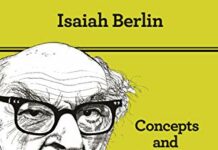
Ebook Info
- Published: 2013
- Number of pages: 354 pages
- Format: PDF
- File Size: 4.59 MB
- Authors: Isaiah Berlin
Description
The essays collected in this new volume reveal Isaiah Berlin at his most lucid and accessible. He was constitutionally incapable of writing with the opacity of the specialist, but these shorter, more introductory pieces provide the perfect starting-point for the reader new to his work. Those who are already familiar with his writing will also be grateful for this further addition to his collected essays. The connecting theme of these essays, as in the case of earlier volumes, is the crucial social and political role–past, present and future–of ideas, and of their progenitors. A rich variety of subject-matters is represented–from philosophy to education, from Russia to Israel, from Marxism to romanticism–so that the truth of Heine’s warning is exemplified on a broad front. It is a warning that Berlin often referred to, and provides an answer to those who ask, as from time to time they do, why intellectual history matters. Among the contributions are “My Intellectual Path,” Berlin’s last essay, a retrospective autobiographical survey of his main preoccupations; and “Jewish Slavery and Emancipation,” the classic statement of his Zionist views, long unavailable in print. His other subjects include the Enlightenment, Giambattista Vico, Vissarion Belinsky, Alexander Herzen, G.V. Plekhanov, the Russian intelligentsia, the idea of liberty, political realism, nationalism, and historicism. The book exhibits the full range of his enormously wide expertise and demonstrates the striking and enormously engaging individuality, as well as the power, of his own ideas. “Over a hundred years ago, the German poet Heine warned the French not to underestimate the power of ideas: philosophical concepts nurtured in the stillness of a professor’s study could destroy a civilization.”–Isaiah Berlin, Two Concepts of Liberty, 1958. This new edition adds a number of previously uncollected pieces, including Berlin’s earliest statement of the pluralism of values for which he is famous.
User’s Reviews
Reviews from Amazon users which were colected at the time this book was published on the website:
⭐Liberty/Freedom today is intimately interwoven with equality/status. Why?“All this has little to do with the classical Western notion of liberty as limited only by the danger of doing harm to others.’’This is the ‘night watchman state’ that is rejected by most. Why?“It is the non-recognition of this psychological and political fact (which lurks behind the apparent ambiguity of the term ‘liberty’) that has, perhaps, blinded some contemporary liberals to the world in which they live. Their plea is clear, their cause is just. But they do not allow for the variety of human wishes, for the different, quite incompatible, kinds of life for which men are ready to fight and, if need be, die.’’The key insight here is ‘incompatible’. No these desires are not rational, not even possible!“Nor do such good and rational men allow for the terrible ingenuity with which men can prove to their own satisfaction that the road to one ideal also leads somehow to its contrary. Men want too much: they want what is logically impossible. That is why such sacred symbols as ‘liberty’ and ‘democracy’ and self-governmental ‘rights’ cover such a multitude of ideals which conflict with one another. It is as well to realise this. Things are what they are: status is one thing, liberty another; recognition is not the same as non-interference.’’Does seem to explain much of current confusion. Why is this deteriorating?“In the end we all pay too dearly for our wish to avert our gaze from such truths, for ignoring such distinctions in our attempts to coin words to cover all that we long for, in short for our desire to be deceived.’’ (240)‘Desire to be deceived’! Wow!Another deep insight. . .“Hence German nationalism: I do this not because it is good or right or because I like it –I do it because I am a German and this is the German way to live. So also modern existentialism –I do it because I commit myself to this form of existence. Nothing makes me; I do not do it because it is an objective order which I obey, or because of universal rules to which I must adhere; I do it because I create my own life as I do; being what I am, I give it direction and I am responsible for it.’’This description of German ‘romanticism’ is a key theme in this series of essays. What does it include and why so important?“Denial of universal values, this emphasis on being above all an element in, and loyal to, a super-self, is a dangerous moment in European history, and has led to a great deal that has been destructive and sinister in modern times; this is where it begins, in the political ruminations and theories of the earliest German Romantics and their disciples in France and elsewhere.’’ (11)Why ‘dangerous moment’?“Someone once remarked that in the old days men and women were brought as sacrifices to a variety of gods; for these, the modern age has substituted new idols: -isms. To cause pain, to kill, to torture are in general rightly condemned; but if these things are done not for my personal benefit but for an -ism –socialism, nationalism, Fascism, Communism, fanatically held religious belief, or progress, or the fulfillment of the laws of history –then they are in order.’’ (16)Idolatry is always, everywhere and in every form, destructive!Berlin also writes against ‘determinism’. Why so popular?“My thesis is that there are two main reasons for supporting the doctrine of human determinism. The first is that, since the natural sciences are perhaps the greatest success story in the whole history of mankind, it seems absurd to suppose that man alone is not subject to the natural laws discovered by the scientists.’’ (21)Men are just atoms, chemicals, flesh. All these are subject to laws of physics and chemistry!“The second reason for belief in determinism is that it does devolve the responsibility for a great many things that people do on to impersonal causes, and therefore leaves them in a sense unblameworthy for what they do.’’ (21)Wow! No guilt? No responsibility? Great!My Intellectual PathThe Purpose of PhilosophyThe Philosophers of the EnlightenmentOne of the Boldest Innovators in the History of Human ThoughtRussian Intellectual HistoryThe Man Who Became a MythA Revolutionary without FanaticismThe Role of the IntelligentsiaLibertyThe Philosophy of Karl MarxThe Father of Russian MarxismRealism in PoliticsThe Origins of IsraelJewish Slavery and EmancipationChaim Weizmann’s LeadershipThe Search for StatusThe Essence of European Romanticism Meinecke and HistoricismGeneral EducationAppendix to the Second EditionDemocracy, Communism and the IndividualWoodrow Wilson on EducationA Note on NationalismIndexThe appendix includes essay: “A note on Nationalism’’. Trenchant. . .“. . .that it is a secular faith that has been generated by the need to fill the vacuum created by the decline of religion; or that it is a by-product of the class war –a form of opium deliberately fed to, or even generated by, the proletarians, calculated to make them obey and defend their capitalist masters; and so on. But the vast changes in the social and political structure of mankind have not in fact caused nationalism to vanish or even grow less powerful. If anything, it has battened upon wars and revolutions, and is today stronger and more dangerous than ever. Indeed, there is a case for saying that if mankind annihilates itself, it will do so in an outbreak of nationalistic and not social violence.’’ (301)Still valid. Where did this new ‘religion’ come from?“Nor can 1914 be explained, as some socialists have attempted to do, purely in terms of the rivalries of national-capitalist combines –as the clash of imperialisms, themselves the last stage of predatory capitalism engaged in internecine war. What occurred, as is now generally agreed, was more complex: the mounting desire among the great European States for national power and glory –sheer nationalist sentiment of an irrational kind –was, if anything, an obstacle to the free development of world capitalism, which might have come to peaceful agreements for the combined exploitation of raw materials and native peoples in a coldly opportunist, ruthlessly calculating atmosphere. It was nationalist violence that blew to pieces not merely the calculations of big business.’’ (304)War is destructive, not productive in any way. This is not about money, business or anything material. It was a passionate, irrational, even spiritual force. . .“Had anyone predicted this in an age famed for prophecies –in the middle of the eighteenth century –such a picture would, I suspect, have been greeted with incredulity and dismissed as a harmless nightmare. Yet this very eighteenth century, which we tend to think of as elegant, well-ordered, placid, reasonable, unenthusiastic, a little dull, but above all self-satisfied, and sceptical and ironical to the point of cynicism –this very eighteenth century, when looked at more closely, turns out to be the cauldron in which violent passions grew and seethed until they broke through the surface in its last decade.’’ (305)Well. . .as the prophet said – “Kingdom against Kingdom and Nation against Nation’’ (Matt 24:7) – yes, that is what Berlin is talking about.
⭐Un repaso histórico extraordinariogood book
⭐
Keywords
Free Download The Power of Ideas: Second Edition 2nd Edition in PDF format
The Power of Ideas: Second Edition 2nd Edition PDF Free Download
Download The Power of Ideas: Second Edition 2nd Edition 2013 PDF Free
The Power of Ideas: Second Edition 2nd Edition 2013 PDF Free Download
Download The Power of Ideas: Second Edition 2nd Edition PDF
Free Download Ebook The Power of Ideas: Second Edition 2nd Edition





